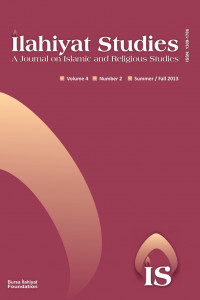Öz
First paragraph: The book under review fits within the literature on the history of dialectics and the art of disputation in the Islamic civilization, as reflected by the title Argumentation et dialectique en Islam. As the author Abdessamad Belhaj affirms in his introduction, the scope of this work is to undertake a reconstruction of the development of the ʿilm al-jadal and the art of munāẓara as argumentative processes in both fiqh and kalām traditions. Belhaj states that his project is to draw the historical development of jadal and munāẓara by taking into account the gaps of the major secondary literature. Put differently, this filling-in-the-gaps project seeks to provide a tableau of the way the notions of jadal and munāẓara have been used and developed in different milieus of the classical Islamic world.
Öz
First paragraph:
The book under review fits within the literature on the history of dialectics and the art of disputation in the Islamic civilization, as reflected by the title Argumentation et dialectique en Islam. As the author Abdessamad Belhaj affirms in his introduction, the scope of this work is to undertake a reconstruction of the development of the ʿilm al-jadal and the art of munāẓara as argumentative processes in both fiqh and kalām traditions. Belhaj states that his project is to draw the historical development of jadal and munāẓara by taking into account the gaps of the major secondary literature. Put differently, this filling-in-the-gaps project seeks to provide a tableau of the way the notions of jadal and munāẓara have been used and developed in different milieus of the classical Islamic world.
Anahtar Kelimeler
Ayrıntılar
| Birincil Dil | İngilizce |
|---|---|
| Konular | Din Araştırmaları |
| Bölüm | Kitap İncelemeleri |
| Yazarlar | |
| Yayımlanma Tarihi | 12 Haziran 2014 |
| Gönderilme Tarihi | 1 Haziran 2013 |
| Yayımlandığı Sayı | Yıl 2013 Cilt: 4 Sayı: 2 |


